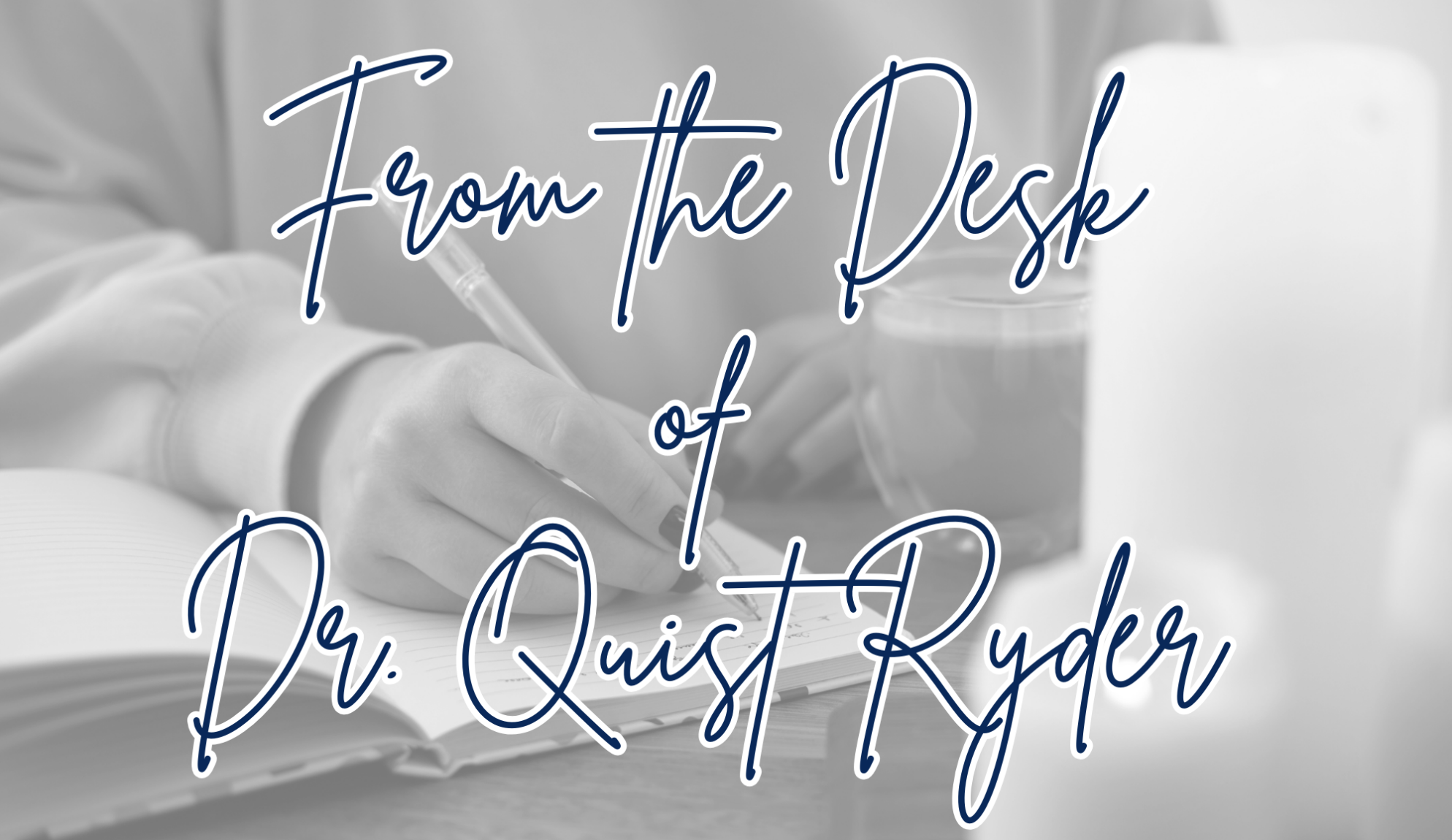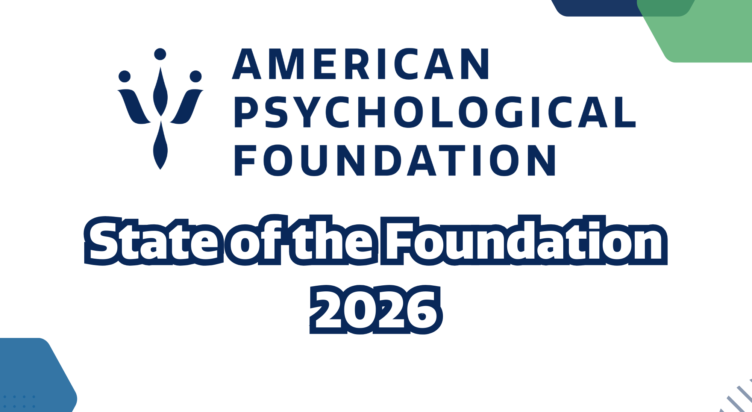World Health Day: The Mind-Body-Health Connection


From the Desk of Dr. Quist Ryder is a space for APF’s CEO to share insights and observations on APF initiatives, the state of psychology, and how philanthropy and psychology can work together to create a world where people are healthy, happy, and living with dignity.
It always gets to me when people talk about health like it’s just about the body. Especially now—when we’re all living through global crises, political chaos, and way too much change—it feels almost reckless not to include mental health in those conversations. Chronic stress and anxiety have gone from occasional nuisances to something many of us just… live with. Burnout isn’t rare anymore; it’s routine.
The frustrating part? We know better. We’ve learned so much about how to care for our mental health, but we still treat it like a bonus feature instead of a basic need. If we’re serious about creating a healthier, happier society, we have to start by treating mental well-being as a core part of health—not an optional add-on.
The Science Behind the Mind-Body Connection
We talk about the mind and body like they’re separate all the time. Spoiler alert: they’re not. They’ve evolved to work together as one system, constantly feeding back into each other. And when we pretend they don’t, we miss out on understanding how our emotional state affects our physical health—and vice versa.
Stress, anxiety, depression—these aren’t just feelings. They kick off real physiological responses in the body, from disrupted sleep to a weakened immune system. Decades of research back this up. Chronic negative emotions have been linked to all sorts of health problems: heart disease, high blood pressure, immune dysfunction—you name it (Leger et al., 2018; Segerstrom & Miller, 2004).
On the flip side, nurturing your mental health can actually boost physical health. Patients with chronic illness tend to recover better when they experience emotional support and positive mental states like gratitude or optimism (Lamers et al., 2011; Dubois et al., 2015). Mental health isn’t just connected to physical health—it’s essential to it.
That’s why the American Psychological Foundation (APF) has made the mind-body-health connection one of our Visionary Priorities. We’re putting resources behind research that explores how psychology can improve lives—from cancer recovery (see the Alice F. Chang Cancer Wellness Grant) to everyday resilience. It’s not just talk. It’s action.
The Role of Psychology in Healthcare—And Where We Go from Here
Healthcare systems are starting to come around on the importance of mental health, which is encouraging. But there’s still a long way to go.
Right now, psychological support is often reactive. Someone experiences trauma, gets a tough diagnosis, or hits a mental health crisis—and then we bring in the psychologists. That kind of care is absolutely vital. But imagine how much stronger we’d be if we started before the breakdown?
Preventive care that includes mental health—things like regular emotional check-ins, learning to regulate emotions, building coping skills—isn’t just a nice idea. It’s a powerful way to build resilience and protect long-term health.
So What Can We Do Right Now?
Here are some simple but powerful ways we can care for both mind and body in daily life:
1. Learn How Your Brain Works (and Watch Out for Misinformation)
Getting curious about how your brain handles stress, emotions, and decision-making is one of the best gifts you can give yourself. The more we understand our minds, the better we can care for them. Just be careful about your sources—there’s a lot of wellness content out there that sounds smart but isn’t backed by science.
2. Manage Stress (Not All Stress Is Bad!)
Stress isn’t the enemy—it’s part of life. In fact, some stress (called eustress) can actually help us grow. It’s the kind of stress that comes from taking on challenges, learning something new, or pushing ourselves outside our comfort zones.
Distress, on the other hand, is the unpleasant kind—and when it becomes chronic, that’s when we see real damage to both mental and physical health. The key isn’t to eliminate all stress, but to find ways to manage it that work for you. Mindfulness, movement, talking it out, setting boundaries—it all counts.
3. Cultivate Real Positivity
Here’s the deal: real positivity helps. Fake positivity doesn’t. Psychological research shows that genuine emotions like gratitude, hope, and optimism can seriously improve your health—but only when they’re authentic.
So don’t force it. Create space for those emotions to grow by surrounding yourself with people and environments that make you feel good. Find joy in small rituals or meaningful projects. The goal isn’t to pretend everything’s great. It’s to build a life where good things can actually take root.
4. Move Your Body, Mindfully
Exercise isn’t just for your body—it’s for your brain, too. Physical movement releases endorphins that help regulate mood, reduce stress, and calm the nervous system. And it doesn’t have to be intense. Whether you’re doing yoga, walking your dog, dancing in your kitchen, or lifting weights—moving mindfully can ground you and help you process emotion in a physical way.
At the end of the day, the mind and body aren’t in competition, they’re teammates. When we care for both, we give ourselves the best shot at staying healthy, resilient, and whole. On this World Health Day, let’s commit to treating mental health not as an afterthought, but as a vital part of what it means to be well.
References
DuBois, C. M., Lopez, O. V., Beale, E. E., Healy, B. C., Boehm, J. K., & Huffman, J. C. (2015). Relationships between positive psychological constructs and health outcomes in patients with cardiovascular disease: A systematic review. International journal of cardiology, 195, 265–280. https://doi.org/10.1016/j.ijcard.2015.05.121
Lamers, S.M.A., Bolier, L., Westerhof, G.J. et al. The impact of emotional well-being on long-term recovery and survival in physical illness: a meta-analysis. J Behav Med 35, 538–547 (2012). https://doi.org/10.1007/s10865-011-9379-8
Leger, K. A., Charles, S. T., & Almeida, D. M. (2018). Let It Go: Lingering Negative Affect in Response to Daily Stressors Is Associated With Physical Health Years Later. Psychological science, 29(8), 1283–1290. https://doi.org/10.1177/0956797618763097
Segerstrom, S. C., & Miller, G. E. (2004). Psychological stress and the human immune system: a meta-analytic study of 30 years of inquiry. Psychological bulletin, 130(4), 601–630. https://doi.org/10.1037/0033-2909.130.4.601
Want to create impact through the power psychology? Donate to APF today!
Topics: CEO Blog Direct Action Health
Discover More

2026 APF State of the Foundation
Hosted by APF President Dr. Melba Vasquez and APF CEO Dr. Michelle Quist Ryder, this event recapped APF’s impact in 2025 and celebrated the progress made possible by our incredible community. This event featured a first look at the 2025 APF Impact Report, including updates on our Direct Action programs, exciting new partnerships, and the stories and data that defined a truly transformative year for the Foundation (and for the future of psychology)! We also shared a sneak peek of upcoming initiatives that are designed to expand psychology’s reach where it’s needed most.

Partners in Impact with Dr. Diana Slaughter Kotzin | APF Donor Spotlight
Partners in Impact is a space for APF to highlight our donors, whose generosity and partnership enables psychology to tackle some of today’s most important challenges. In our first edition, we’re thrilled to feature Dr. Diana Slaughter Kotzin, who co-founded the Dr. Diana Slaughter Kotzin and Mr. Joseph G. Kotzin Fund Grant.

American Psychological Foundation Announces Two New Direct Action Visionary Grant Awardees
American Psychological Foundation Announces Two New Direct Action Visionary Grant AwardeesPrograms to support trans and nonbinary young people as well as trauma intervention for parents …
